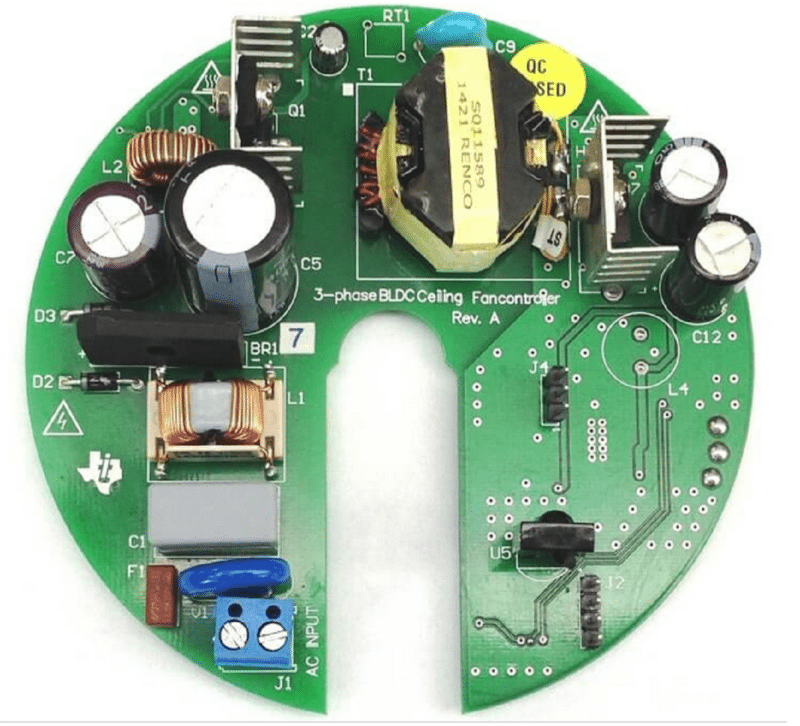The next generation of home ceiling fans and server fans exclusively use 3-Phase brushless DC (BLDC) motors as they offer many advantages such as longer life, low power consumption, and lighter weight compared to AC induction motors. For example, a 5W 3-Phase BLDC motor can achieve the performance of a 30W AC motor. Furthermore, they can be used to offer additional functionality like air movement control according to time of day and temperature, minimal motor vibration, etc.
Take a look at the write-up below to discover some BLDC motor reference designs for fan control applications:-
Low-Noise BLDC Sensorless Ceiling Fan Controller:

This reference design is a complete solution for a brushless DC ceiling fan controller for cost-sensitive, low-noise and low external component count applications. The design features a low-power MSP430G2201 processor that decodes infrared signals for speed control. To reduce acoustic effects resulting from commutation, the design uses a motor driver DRV10983 that uses a sensorless control to provide continuous sinusoidal current to the motor. A Flyback controller UCC28630 converts universal AC input into 24 VDC. The interface to the device is simple and flexible. Motor parameters can be configured through an I2C interface to optimise the performance of a given application. Easy integration with standard infrared remotes is possible through firmware. More on this Reference Design
BLDC Fan Motor Control based on Hall-effect Sensor Input:
This reference design is a H- bridge BLDC fan controller based on a 8-bit microcontroller. The MCU takes an input from a Hall sensor rather than an external temperature sensor to control the commutation of the motor. Thus, the speed can be controlled based on the object temperature. The Z8 Encore XP 8-pin MCU uses its own ADC to generate a Pulse width modulated (PWM) signal to control the speed. The design provides many additional features such as motor stall detect condition and over-current detection. In-circuit programming allows the upgradation of the firmware for evaluation purposes. This reference design comes along with complete source code and schematics. More on this Reference Design
Variable Speed DC Fan Control using a 3-phase BLDC motor:
This reference design describes a brushless DC fan controller generally used in chip cooling or system ventilation applications. The design is built around an ultra low cost MC9RS08KA2 8-bit microcontroller (MCU) from Freescale. The MCU is ideal for fan controller application as it is low-cost and can easily fit into the fan controller printed circuit board (PCB). The MCU controls the fan speed by taking ambient temperature input from an external temperature sensor. The speed is modified according to changes in temperature with the environmental changes. In case of motor jam or air flow blockage, the MCU immediately stops the motor to avoid damage and raises a buzzer alarm through a Pulse width modulated (PWM) output. More on this Reference Design
Server Fan Controller Design based on 32-bit MCU:
This is a reference design of a fan control solution that meets the two main requirements of fan motor drive applications: low audible noise and high efficiency. To offset the high cost of 3-phase fan motors, the design uses a 32-bit ARM microcontroller (XMC1302) that provides a robust motor control algorithm to improve efficiency and reduce the external component count. The MCU uses a sensorless ready-to-use Field of control (FOC) firmware for fast implementation. More on this Reference Design








